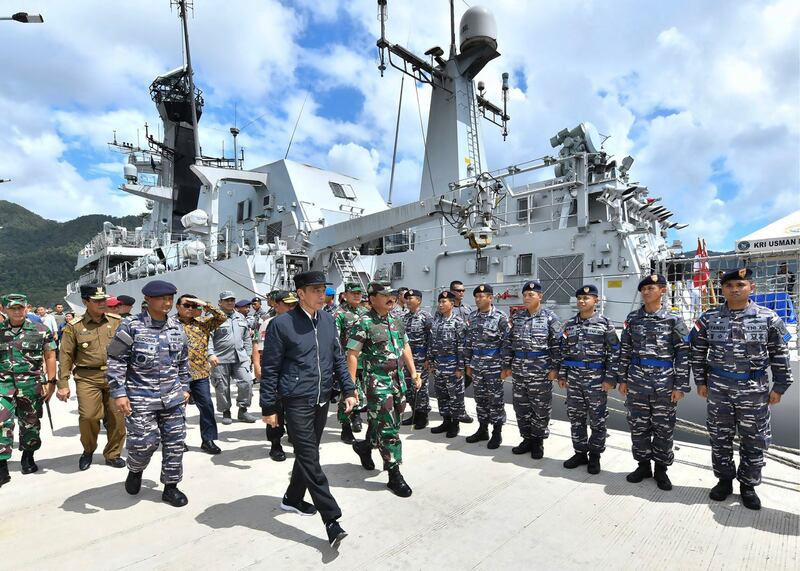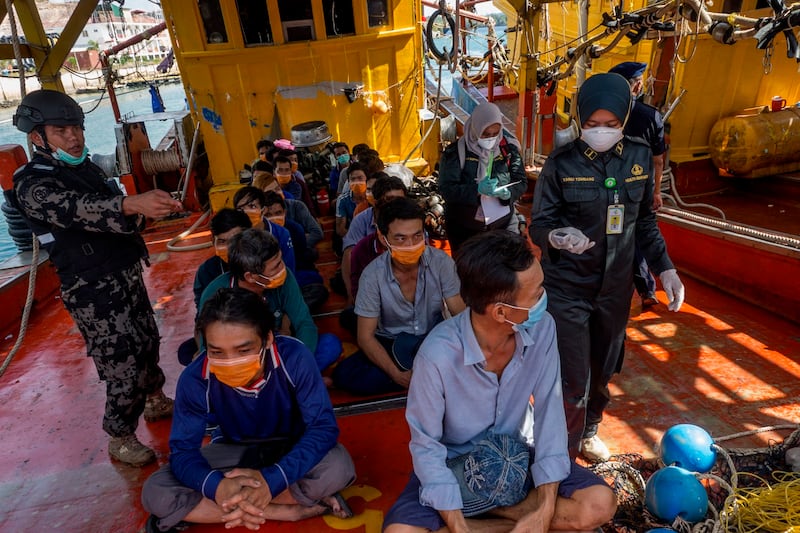Indonesian President Joko Widodo and his Vietnamese counterpart agreed Friday to push towards the conclusion of a “substantive and effective” Code of Conduct for the South China Sea amid rising tensions in the region.
Widodo, popularly known as Jokowi, is in Hanoi on the second leg of his tour to three Southeast Asian countries – the Philippines, Vietnam and Brunei.
Jokowi and Vietnamese President Vo Van Thuong held a meeting to discuss the strategic partnership between the two countries, Vietnam's state media reported.
“The two leaders reiterated the importance of peace, stability, security and freedom of navigation in the East Sea,” said the official Voice of Vietnam (VOV), referring to the South China Sea by its Vietnamese name.
“[They] underscored the importance of the full and effective implementation of the Declaration on the Conduct of Parties in the South China Sea (DOC) and committed to working towards the conclusion of a substantive and effective Code of Conduct (COC) that is in accordance with international law, including the 1982 United Nations Convention on the Law of the Sea (UNCLOS),” VOV said.
Vietnam and Indonesia will cooperate to maintain ASEAN’s unity and solidarity, as well as the Southeast Asian bloc’s common approach in dealing with maritime issues, it added.
China and ASEAN agreed on a DOC in 2002, but progress on a legally binding COC has been slow going amid an increasing risk of conflict.
Before Hanoi, while visiting Manila (Jan. 9-11) Jokowi also discussed the South China Sea with President Ferdinand Marcos Jr. and "affirmed our insistence on the universality of UNCLOS, which sets out the legal framework that governs all activities in the oceans and in the seas," according to an official statement.
Manila has accused Beijing of escalating aggression in the waters under the Philippines’ jurisdiction, or the West Philippine Sea. China refuted the accusations and blamed the Philippines for “provocation.”
Maritime cooperation
In light of recent developments in the South China Sea, “on Dec. 30, 2023, ASEAN foreign ministers issued a joint statement on maintaining and promoting stability in the maritime sphere in Southeast Asia,” said Ristian Atriandi Supriyanto, lecturer on international relations at Universitas Indonesia.
“Consistent with this joint statement, [during Jokowi’s visit] the two sides – Indonesia and Vietnam – will agree to avoid actions that may further complicate the situation,” said Supriyanto, who is also a fellow at Forum Sinologi Indonesia, a research institution.
But much will depend on China which “does not want any of the ASEAN claimants to base their actions only on UNCLOS,” according to the academic.
“From Beijing’s perspective, the only way to manage and settle the disputes is to negotiate with China directly. Anything else China sees as counterproductive, even provocative,” he said.
Six parties – Brunei, Malaysia, the Philippines, Vietnam, Taiwan and China – claim parts of the South China Sea. Beijing’s claim, the so-called nine-dash line, encircles almost 90% of the sea.

Indonesia is not a claimant in the broader sea but its exclusive economic zone (EEZ) claim overlaps with those of Malaysia and Vietnam, as well as with China’s ‘nine-dash line.’
“Indonesia too is a little bit cautious in their approach to the whole dispute in the South China Sea,” said Nguyen The Phuong, a Vietnamese security analyst.
“They have strong material capabilities, as well as being seen as the de-facto leader of ASEAN but not being one of the claimants makes them hesitant to push hard on the issue,” said Phuong, who is currently studying for a PhD at UNSW Canberra at the Australian Defence Force Academy.
It doesn’t mean Vietnam and Indonesia can’t “continue cooperation in maritime law enforcement in both bilateral and multilateral manners,” according to the analyst.
The Vietnamese and Indonesian navies reached an agreement on joint training procedures in 2021 and the two countries’ coast guard forces at the end of 2022 also signed a memorandum of understanding on security cooperation.
“Maybe there will be other agreements on defense cooperation, especially the defense industry,” Phuong said.
Agreement on boundaries
In 2023, Indonesia as the rotating chairman organized a five-day ASEAN Solidarity Exercise (ASEX 23) – the grouping’s first ever joint naval drills focusing on humanitarian disaster responses.
Ristian Atriandi Supriyanto from Universitas Indonesia, who proposed ASEAN ‘coordinated patrols’ in the South China Sea, said the bloc needs “novel initiatives” when dealing with China’s excessive claims.
“The fact is that countries have tried for decades negotiating with China in vain,” he said, “China does not back down from its nine-dash line, which others including Vietnam and Indonesia, do not recognize.”
“Coordinated patrols can be one of those initiatives, which can start with two ASEAN countries, like Indonesia and Vietnam, before expanding it to others,” Supriyanto told RFA.
Vietnamese analyst Nguyen The Phuong, however, casted doubt on the idea.
“Vietnam until now has been very reluctant on joining any joint patrol with other countries, so I don't think that approach would change anytime soon,” he said, adding that the two countries could still cooperate on other important issues such as fighting against illegal, unreported and unregulated (IUU) fishing.
On Friday, Jokowi and his Vietnamese host Thuong witnessed the signing of a memorandum on fisheries cooperation.

Jakarta has long been complaining about illegal activities by Vietnamese fishing vessels in the waters surrounding the Natuna Islands in the South China Sea where the two countries’ claims overlap.
In December 2022, after 12 years of negotiations, Indonesia and Vietnam finally reached an agreement on the boundaries of their exclusive economic zones. Yet until now the two countries are still in the process of finalizing the implementing arrangements and the agreed boundary demarcation has not been made public.
“If the agreement is really final, then the two sides should publish the map,” said Ristian Atriandi Supriyanto. “I guess they have not published it due to concerns of provoking China like the Malaysia-Vietnam joint submission of continental shelf did in May 2009.”
Just one day after the joint submission of Malaysia and Vietnam to the U.N., China filed a formal communication stating that the joint submission seriously infringed China’s sovereignty, sovereign rights and jurisdiction in the South China Sea.
“In this case, not publishing the map is one of the ways to avoid actions that may further complicate the situation,” said the Indonesian scholar.
“The way I see it, however, this plays directly into the Chinese playbook of keeping it low and subtle while Beijing persuades and pressures other claimants and non-claimants alike to accommodate its nine-dash line,” he added.
Edited by Mike Firn and Elaine Chan.
